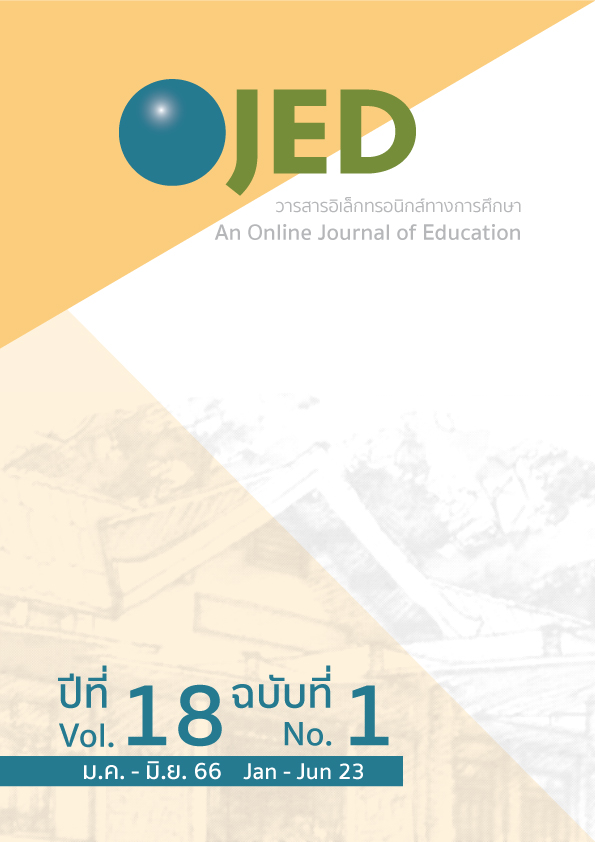Development of Reading Comprehension Learning Package Based on Balanced Literacy Approach for Elementary Students
DOI:
https://doi.org/10.14456/ojed.2023.8Keywords:
learning package, comprehension learning, balanced literacyAbstract
The purposes of this research were 1) to develop a reading comprehension learning package based on the balanced literacy approach for elementary school students, and 2) to study reading comprehension before and after participating in learning activities. The participants consisted of 28 fourth-grade Thai students. The research instruments were 1) a learning package based on the balanced literacy approach for elementary students; 2) a reading comprehension test; and 3) a student reading behavior observation form. The statistics used in the research were the Mean (M) and Standard Deviation (SD) and dependent simple t-test. The results of this research were as follows: 1) The key elements of the learning package based on a balanced literacy approach for elementary students consisted of (1) the concept of the activity set, (2) the purposes of the activity set, (3) the process of organizing activities in the activity set, (4) the approach to the use of the activity set, and (5) the evaluation approach. 2) students’ level of reading comprehension abilities was also higher after using a package based on a Balanced literacy approach at
the .05 level of significance.
References
ภาษาไทย
กระทรวงศึกษาธิการ. (2551). หลักสูตรแกนกลางการศึกษาขั้นพื้นฐาน พุทธศักราช 2551. โรงพิมพ์ชุมนุมสหกรณ์การเกษตรแห่งประเทศไทย.
กันตวรรณ มีสมสาร. (2554). การพัฒนารูปแบบการเรียนการสอนภาษาโดยบูรณาการแนวสมดุลภาษาและการเรียนรู้แบบ ร่วมมือเพื่อส่งเสริมความสามารถทางภาษาของนักเรียนชั้นประถมศึกษาปีที่ 1 [วิทยานิพนธ์ปริญญามหาบัณฑิต, จุฬาลงกรณ์มหาวิทยาลัย]. Chulalongkorn University Intellectual Repository (CUIR). http://cuir.car.chula.ac.th/handle/ 123456789/22080
ฉันทนา ภาคบงกช. (8-9, พฤษภาคม, 2531.) พัฒนาการทางภาษาแบบ Whole Language สำหรับปฐมวัย.การประชุมเชิง ปฏิบัติการเรื่องพัฒนาการทางภาษาแบบ Whole Language สำหรับปฐมวัย. สถาบันวิจัยพฤติกรรมศาสตร์ มหาวิทยาลัยศรีนครินทรวิโรฒประสานมิตร.
เฉลิมศรี เรียนประเสริฐ. (2537). การเปรียบเทียบความเข้าใจในการอ่านของนักเรียนชั้นมัธยมศึกษาปีที่ 3 ที่ ได้รับการสอน อ่านแบบ OKSR กับการสอนอ่านแบบเดิม. [ปริญญานิพนธ์ปริญญามหาบัณฑิต ไม่ได้ตีพิมพ์]. มหาวิทยาลัย
ศรีนครินทรวิโรฒประสานมิตร
ถนอมวงศ์ ล้ำยอดมรรคผล. (2552). การอ่านให้เก่ง. กระดาษษา.
บุษบง ตันติวงศ์. (2536). นวัตกรรมการสอนภาษาธรรมชาติในการอ่านเขียนของเด็กปฐมวัย เทคนิคและวิธีการสอนระดับ ปฐมวัย. โรงพิมพ์จุฬาลงกรณ์มหาวิทยาลัย.
วรินทร โพนน้อย. (2555). นวัตกรรมการจัดการเรียนรู้ภาษาไทยแบบสมดุลภาษาสำหรับนักเรียนระดับประถมศึกษา [วิทยานิพนธ์ปริญญาดุษฎีบัณฑิต, มหาวิทยาลัยศรีนครินทรวิโรฒ]. thesis.swu. http://thesis.swu.ac.th/ swudis/Cur_Re_Dev/Warintorn_P
ศิวกานท์ ปทุมสูติ. (2553). คู่มือการอ่านคิดวิเคราะห์. นวสาส์นการพิมพ์.
อารี สัณหฉวี. (2550). สอนภาษาไทยแนวสมดุลภาษา (ชั้นอนุบาล 1- ประถมปีที่ 6). สมาคมเพื่อการศึกษาเด็ก.
ภาษาอังกฤษ
Allen, D. & Piersma, M. (1995). Developing Thematic Units: Process and Product. Delmar.
Boulware, B. J. & Crow, M. L. (2008). Using the concept attainment strategy to enhance reading comprehension. The reading teacher. (491-495). International Literacy Association.
Goodman, K. (1986). What’s Whole in Whole Language. Heinemann.
Fitzgerald, J. (1999). What is this thing called “balance”? The Reading Teacher, 53(2), 100-107
https://www.jstor.org/stable/20204755
McCarrier, A., Pinnell, G. S., & Fountas, I. C. (2000). Interactive Writing: How Language & Literacy Come Together. Heinemann.
Rief, S., & Heimburge, J. (2007). How to Reach and Teach All Children Through Balanced Literacy. Jossey- Bass.
Downloads
Published
How to Cite
Issue
Section
License
Copyright (c) 2023 An Online Journal of Education

This work is licensed under a Creative Commons Attribution-NonCommercial-NoDerivatives 4.0 International License.




